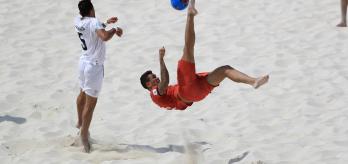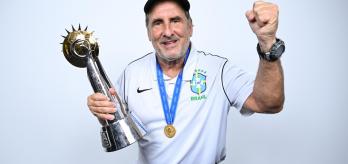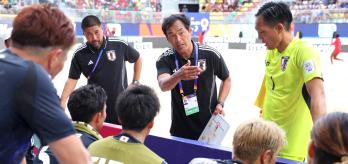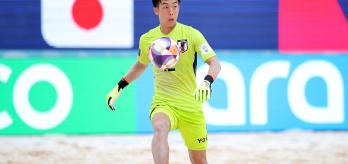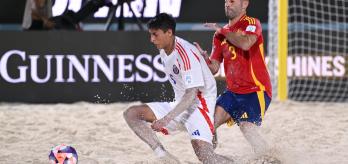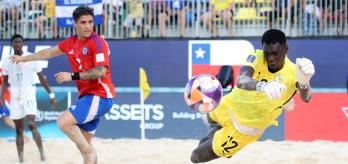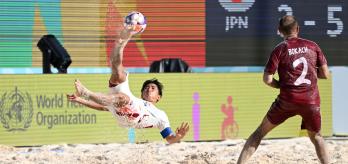The South American side broke records along the way, conceding just eight goals in their six matches (an average of 1.33 per game), the fewest ever to be conceded by the winning team. In this interview, head coach Marco Octávio speaks candidly about the nuanced work that helped his side retain the FIFA Beach Soccer World Cup.
Read our interview with Marco Octávio
You’ve had a little time to reflect on your World Cup win, your second in two years – how different is it this time?
That’s an interesting question because, for us, in 2024, the pressure was a bit higher as it had been a long time since Brazil had won the World Cup. The fans, and all the people in Brazil, expect us to be at the top, but we created a good atmosphere and ambience in the group and went with a big responsibility to Dubai in 2024. However, this time (2025), it was also difficult because we changed four players who had been winners with us the year before. It was not an easy decision, but we decided to change it to generate the hunger to win it again and we had to control this. In 2024, the expectations were heavier because we lost in the quarter-finals in 2019 and 2021, but then in Dubai, when we overcame Japan, which was a big weight off our shoulders, we felt lighter going into the semi-finals and the final.
The atmosphere, the location, the weather – we had a really good feeling about it from the start.
How difficult was it to make the decision to change those four players?
After the World Cup in 2024 in Dubai, I studied all of our matches again, not just in the World Cup but in the Copa América too and I observed everything. It was difficult to choose the best 12 players but it was very clear in my mind that I wanted players who would represent us best in that moment. Football happens in moments, and it wasn’t just about winning the World Cup, it was about the character of the players too. I chose the people who were special humans, who think for the team and play with discipline, following our strategy and tactics for each game and it worked.
What did you enjoy most about the Beach Soccer World Cup in the Seychelles?
As soon as we arrived in the airport, people were singing for us (he sings the song), this brought a lot of emotion for everyone in our delegation, and it just felt really right for us from the start. The atmosphere, the location, the weather – we had a really good feeling about it from the start.
What was the most challenging moment in the competition?
This was a really competitive tournament with 16 of the best teams in the world and we were in a very tough group. Our first match was against Italy, the team we played in the last World Cup final – a fantastic team – and this was our opener, so we knew that we could not make a mistake. It was like a knockout game right at the start, so the level of concentration from the players was very focused from the beginning and had that pressure, but I think this really helped us.
Was this the most competitive World Cup, and as the head coach, did you feel there was more pressure on coaches to be able to adapt mid-game as opposed to from game-to-game?
This was such a competitive World Cup. The game has evolved so much and it is getting harder to win but we took lots of time to study all the teams and their strategies and qualities, and we had decided on different approaches for our games against different opponents. For example, the way we were going to play against Italy would be different to the way we would play against Belarus, and we had all of this thought out and planned before the tournament began. We knew we would have to be able to adapt and have different ideas for games against different opponents.
I worked for seven years in Iran and two years in Belarus. Now, I have been working in Brazil for three years, so I have learned that teams and players have special and different characteristics, but what we are seeing now is that beach soccer players are no longer specialists. Players are more complete now and they can play in all moments of the games. Defenders can attack and attackers can defend. Players can play strong in the air and on the sand. This is the future of our sport now. Even for our goalkeepers (Tiago Bobô and Teleco), we measured the distances they were covering and they both covered over 5 kilometres in matches and are now almost matching the distances covered by outfield players.
Goalkeepers no longer just defend their goal, they are vital in the build-up of play: they must organise, create, construct and shoot. This is the evolution of beach soccer, and we have players now who can do everything very well, so there is a lot of work that goes into the preparation but there are also opportunities to create new strategies.
The goalkeeper’s role has become so important in beach soccer and having two strong goalkeepers with different characteristics is a big advantage in a squad. Can you explain the ways/reasons for how you used your goalkeepers in this tournament?
Nowadays, every coach knows how important goalkeepers are and they all have their own individual characteristics. They need to stop goals but also have the capacity to construct the build-up and to analyse and see which side is the best side is to play, where the opponent is potentially weakest. Now, in Brazil, we have four or five goalkeepers with very good levels of different characteristics. We have Bobô, who is strong in construction and defensively, and we have Teleco, who has a fast level of distribution. We have Giovane, who is fantastic with all the characteristics and we have Padilha. We also have Mão, we have many goalkeepers that we can observe who can give us options for the best application of our strategy, and I am very grateful to have that level of goalkeeper to select from. In this World Cup, I think Bobô and Teleco did a very good job. We had to be intelligent to use them in the special moments of the matches and they did really well for the team.
Winning six matches at this level is not easy and we needed 23 people in our delegation with the same spirit, ambition and work ethic for the team.
You and your team have shown the ability to evolve your strategies from one tournament to the next. What was your thinking behind this?
During the year, we watched many, many matches because we wanted a tactical improvement. As a coach, you must understand the characteristics of the players that you have and design the tactics from that. You can’t just say, “I will play 1-3-1 or 1-2-2 or 1-2-1-1.” You must use the characteristics and intelligence of the players that you have during the match. With our experience, we have the possibility to change things quickly in a game and understand which system is going to work best in different moments, but it always relates to the characteristics of the players and how to match the best players to the right moments.
This was a very competitive World Cup. What do you think were the elements that gave your team the extra edge to win the competition?
Firstly, we had a very special group of people. I had to choose 12 players to “Joga bonito” (play beautifully). This is the DNA of Brazil, but it’s not the only thing. We had to choose people with a big heart and a hunger to win, people with a big spirit for the team and unity, and who love the country and wearing the yellow shirt, and we are grateful to God for the inspiration we received. Winning six matches at this level is not easy and we needed 23 people in our delegation with the same spirit, ambition and work ethic for the team.
The final was a very tough match against a strong Belarus side. When the score was 3-3, did you have a plan in the back of your mind for the last part of the game?
Yes, yes of course! We had ideas for what we could need in a moment like that. I remember the last World Cup (2024), and we were losing 2-0 against a very strong IR Iran team in the semi-final. I got the inspiration to use Brendo and Alisson, two players that we hadn’t used a lot during that time, and they were very important and scored the goals that we needed. This time, in the final, when Belarus made the score 3-3, I was thinking in that moment, “What fruits in my team are ripe and sweet?” (He smiles). Of these 12 fruits in my team, which ones will be the sweetest in this moment? So, I preserved Rodrigo in this moment, because he was so in tune in this competition. I decided to preserve him so he could be at his best for the last three minutes, and I put Brendo with Rodrigo. Even though they had not been playing together too much during this World Cup, I got this inspiration and in the second last minute, Brendo blocked the ball and Rodrigo had the energy to run, and they created the moment to win the game.
We also have very experienced players in the group, and they controlled the atmosphere and ambience so we did not lose our direction or focus on winning the title.
Rodrigo had a sensational competition. Can you explain the importance a player like that has in a group?
He is a special player and was voted the best player in the world, but he is more than that. He is a special person. He is very humble and does not look for privileges, he has no ego. He is my captain, and he is very important because he has a great mindset in difficult moments and great control. Even better than me, I learn from him! He has a very calming and balancing manner, and as a coach, I am very grateful to have a player like him to work with. All the players respect him but we also have very experienced players in the group, and they controlled the atmosphere and ambience so we did not lose our direction or focus on winning the title.
Which non-Brazil player impressed you most in the tournament?
There were so many incredible players in this World Cup. But I had the opportunity to work with Ihar Brhystsel (Belarus), as I was his coach previously, and he had an outstanding World Cup. Bê Martins (Portugal) also had a special tournament and Japan’s Takaaki Oba (7) was excellent. He’s a fantastic player. Senegal’s Mandione Diagne (8) and Mamour Diagne (10) were also exceptional, so it’s difficult to pick just one. Belarus goalkeeper Mikhail Avgustov (12), and Iran’s Mohammadali Mokhtari (9) and Ali Mirshekari (7) were also excellent. There were so many outstanding players who really made this tournament a pleasure to watch.
This was an attacking World Cup, with more goals scored, more goals per game, a greater diversity in how those goals were scored, and delightful creativity in the goalscoring mechanisms. 192 goals from open play, and +66 compared to FIFA Beach Soccer World Cup UAE 2024™ – did it feel like a more attacking World Cup?
Yes, 100%, and I have to congratulate all the coaches from all the countries because they are working so hard to improve the quality of all the players, and each year, we are seeing how much players are improving. Their technique, the way they strike the ball, the way they execute bicycle kicks, the organisation of the teams, this is collective work to develop players. Even with Rodrigo, he was voted the best player, but we still work with him to help him improve.
Where do you get your inspiration for designing game strategies?
It’s really important to always watch games and see what can be done. The game is evolving, and you must observe the characteristics of each team and now we must think about how to neutralise the numerical superiority that is created with the goalkeeper. All teams are studying this and thinking of ways to play, and you always must do that with consideration for the characteristics of the goalkeeper.
I started in Beach Soccer in 1996, and I have watched the evolution of the game. We lived in a romantic era in the sport until FIFA became involved. That was an important moment and a real wake up for the beach soccer community where we could become more professional, and the confederations all became more focused and supportive of the sport which sparked a real evolution in the game. Clubs and strong leagues have developed in some countries and that is inspiring others to follow. Now, the game is quicker and players are more technical. The countries with the professional leagues are advancing much faster, and here in Brazil, there are 700 players who want to play, so we need to develop the infrastructure to develop them.
As a head coach with 29 years of experience and having won 215 titles in Beach Soccer, what motivates you to keep evolving in the game?
I’m still really hungry and have a big passion for beach soccer, and I think you have to have that passion. We are always thinking about how to improve our sport, and the quality of analysis now is really helping us to do that. Opportunities for coaches to come together to discuss the game could also be really interesting as it’s a very exciting time in the evolution of beach soccer.




